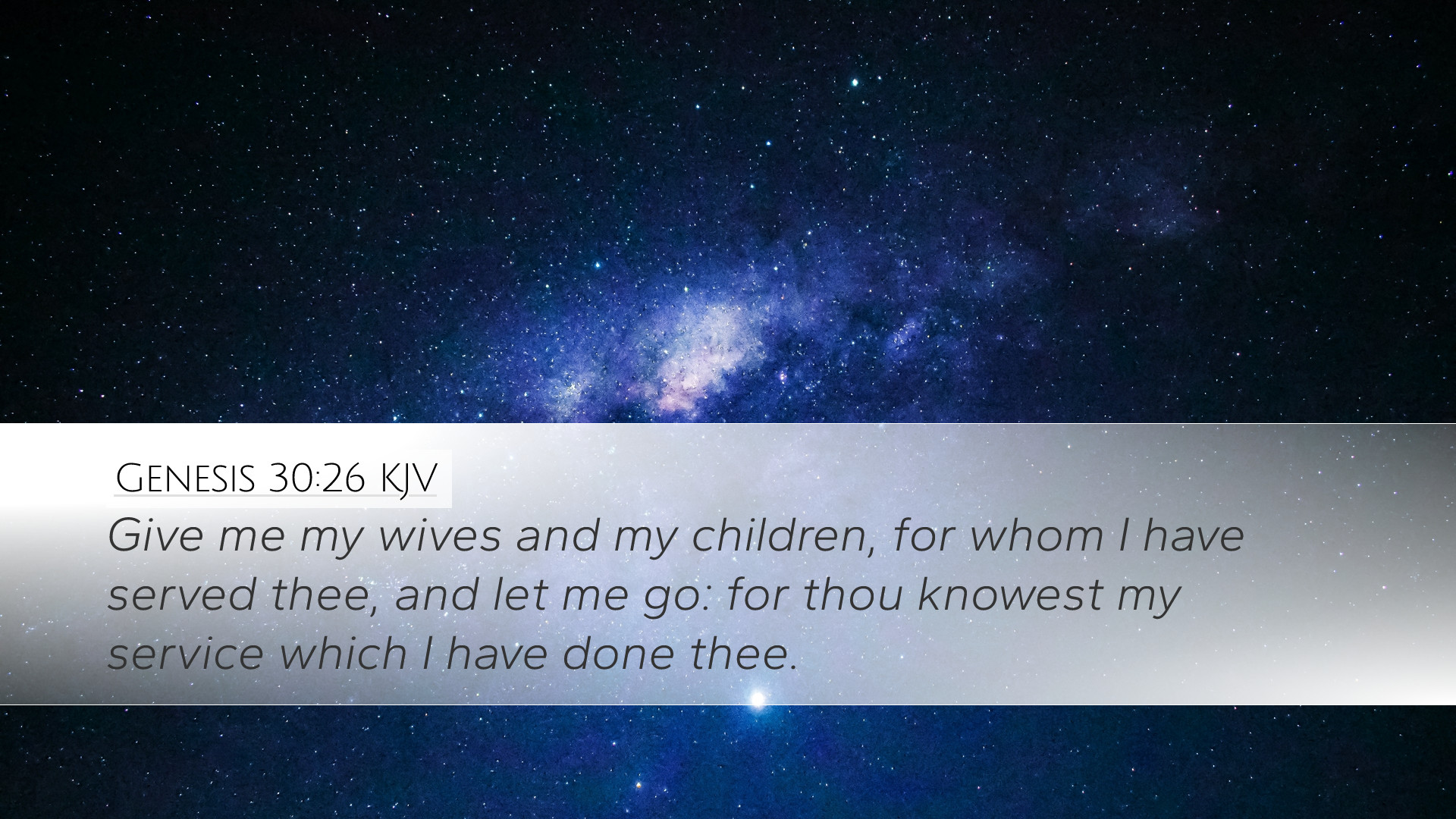Commentary on Genesis 30:26
Verse Context: In Genesis 30:26, Jacob speaks to Laban, saying, "Give me my wives and my children, for whom I have served you, and let me go, for you know the service which I have done for you." This verse marks a crucial moment in Jacob's journey as he prepares to leave Laban's household and return to his homeland.
Introduction to the Commentary
This commentary seeks to explore the significance and implications of Genesis 30:26 by combining insights from esteemed public domain commentaries, including those by Matthew Henry, Albert Barnes, and Adam Clarke. The verse encapsulates themes of labor, reward, family, and the quest for freedom—elements that resonate deeply within the biblical narrative.
Exegesis of Genesis 30:26
1. Jacob's Request to Laban
Jacob's request reflects a culmination of years of labor and service to Laban. He appeals to Laban not merely as a servant but as a family man seeking to reclaim his wives and children. Matthew Henry notes that Jacob's service was marked by diligence, enduring hardship, and the trials of dealing with Laban’s trickery. Henry delineates how Jacob's plea was not just for personal gain but for familial responsibility.
2. The Context of Servitude
Albert Barnes highlights that Jacob had served Laban for a long period, enduring the nuances of Laban's deceptive practices. His statement underscores the tension between servitude and the longing for independence. Jacob had worked tirelessly for Laban, with much of his labor originally tied to earning the hand of Rachel. Barnes emphasizes that this transition from servitude to leader of his own household speaks volumes about God's providence in guiding Jacob through adversity.
Theological Implications
1. Labor and Reward
Jacob's assertion to Laban signifies the biblical principle that hard work should yield rightful rewards. Adam Clarke comments on the moral justice inherent in Jacob's claim, which echoes throughout Scripture, emphasizing the importance of recognizing and valuing labor. This theme resonates in today’s world, where the fruits of one’s labor are often disputed or withheld.
2. Family as Priority
This passage also places significant emphasis on the family unit. Jacob’s insistence on leaving with his family illustrates a critical biblical understanding of familial bonds. Matthew Henry reflects on the emotional weight of this request, stating that Jacob was not leaving empty-handed but rather asserting the importance of his immediate family. Jacob’s desire to gather his household illustrates a deeper commitment, highlighting family as sacred and deserving of protection.
Interpreting the Historical Context
Jacob's journey to this point in Genesis reflects broader themes surrounding Israel's identity. Albert Barnes comments on the larger narrative—Jacob’s experiences foreshadow the struggles and tensions faced by the Israelite people. Just as Jacob was seeking freedom from Laban, so too would Israel seek liberation from oppression. Each family dynamic in Genesis intertwines with national identity, illustrating the deep connections between personal experience and communal heritage.
Character Analysis: Jacob
1. Growth and Transformation
Jacob’s character arc is profound. Initially characterized by deceit and trickery, Jacob evolves through his experiences with Laban. Adam Clarke notes that Jacob’s plea indicates a turning point—moving from a position of manipulation to one of authentic leadership. His insistence on reclaiming his family showcases both accountability and maturity, representing spiritual growth essential to his journey.
2. Trust in Divine Providence
Jacob's request underscores his understanding of divine timing and providence. While he had faced numerous challenges, his decision to leave demonstrates trust that God was leading him. Matthew Henry comments on the faith shown by Jacob; embarking on this journey tested his relationship with God. This act of faith is vital for scholars and theologians as it reflects the importance of reliance on God during transitional phases in life.
Pastoral Insights
For pastors, Genesis 30:26 presents a rich tapestry of themes to explore with congregants:
- The Value of Work: Highlighting the intrinsic value of labor as a means of provision can encourage congregants to view their daily work as a divine calling.
- Family Dynamics: Discussing the sanctity and priority of family can lead to meaningful conversations about caregiving and familial responsibilities in the Christian life.
- Faith in Transition: This verse can encourage individuals facing significant life changes, reinforcing that trusting God is crucial during uncertainty.
Conclusion
Genesis 30:26 serves not only as an account of Jacob’s impending departure from Laban but as a pivotal moment that encapsulates core themes in the Hebrew Scriptures. By analyzing this passage through the lenses of Matthew Henry, Albert Barnes, and Adam Clarke, we notice the multifaceted implications of labor, family, and faith. For scholars, pastors, and students of Scripture, the call to recognize God’s hand in their journeys is profound—a message that transcends time and resonates with the ongoing human experience of seeking purpose, honoring commitments, and understanding God’s providential care.


